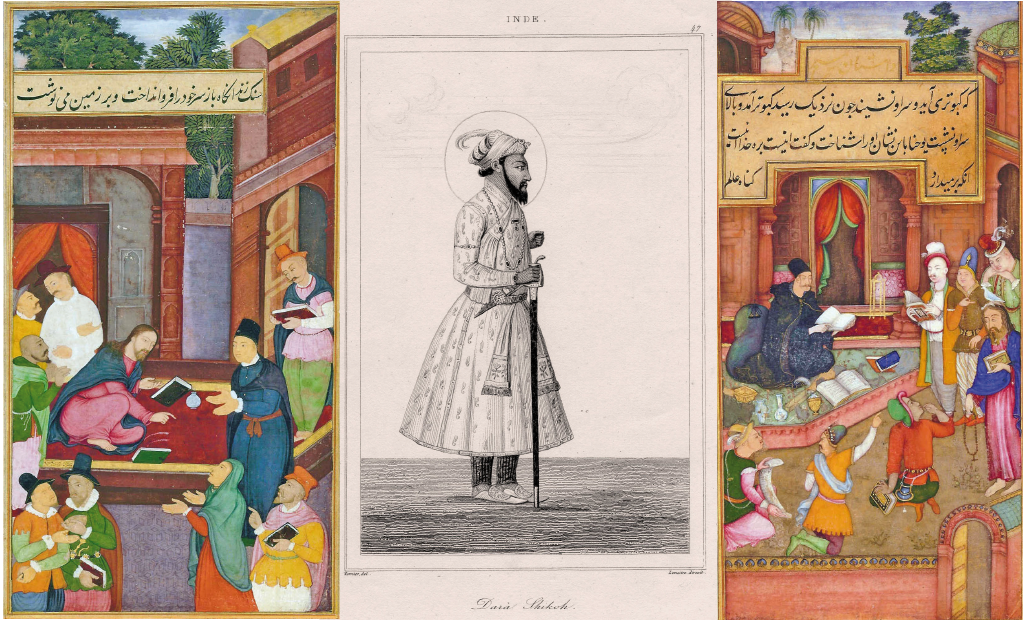Les ateliers du quinquennal 2019-2023 |
Translating History and Historicizing Translation: Redefining the Other and Oneself
Coordinators : Corinne Lefèvre, Fabrizio Speziale, Ines G. Županov
Presentation
This workshop is intended to be both an extension and a reorientation of the previous CEIAS lustrum's, "Self-stories, Stories of Others: Questions of Translation and Historiography." "Translating History and Historicizing Translation: Redefining the Other and Oneself" addresses translation as a preeminent, modern era stimulus for the building and transforming of knowledge both of the Self and the Other in South Asia, and as a unique prism through which to study the phenomena of intellectual hybridization through the construction of scholar/reader networks.
The translation observed. We plan to deconstruct and compare translation practices that are emerging in the South Asian context by first questioning the interpretations of these practices by their practitioners. In other words, what are the translators' views of their practices and how do these views evolve according to translation networks and contexts? What are the aims, aporias, metadiscourses for translation and how do readers' expectations influence translators' styles? How does the act of translation impact literary practices and how do they influence the production of new translations?
The competition between translations: translating oneself and others. In the multi-linguistic space of South Asia, translation is in fact a field in which several source and target languages, cosmopolitan and vernacular, compete according to the socio-political context in which the translation operates and the objective to which it responds: in most documented examples, it is either a question of knowing the other, as in the case of Persian versions of Sanskrit sources, or of making oneself known to the other, as in the case of translations made by missionaries. Hence an essential question: what are the asymmetries and reciprocal influences between the translation of the other and the translation of oneself?
Corollaries of multilingualism. What is the role of intermediate languages in South Asia, given that many translations are not direct adaptations from the original language of the source? What are the forms of continuity and change between translations into different languages of the same target culture, such as in the translation from Sanskrit sources into Persian, Arabic and Urdu? How is the technical and disciplinary lexicon of translated knowledge constructed and developed, and what is the place of multilingualism in this process?
Translation disciplines. Another important consideration is the disciplinary contexts of the knowledge concerned by translation. Translation is a selective practice that excludes certain aspects and fields from the representation of the knowledge of the other and of oneself. In parallel, the transposition of knowledge, or fragments of knowledge, into another knowledge system can redefine the disciplinary registration of translated materials.
Reflective aspects. What are the reflexive aspects of translation? How does the translation of the other's terms and concepts redefine the conceptual scope of the terms of the target culture used in the translation, for example when the Hindu concept of avatar is translated by the Muslim category of nabi (prophet)? In what ways does the translation of the other influence self-knowledge and redefinition? Conversely, what are the reactions to these dynamics?
Translation geographies. Where are the centers of translation? Who are the patrons? Of whom are the translators' and readers' networks composed? What is the circulation horizon for translations produced in South Asia? In particular, their impact in other parts of the Asian and non-Asian world will be examined.
Cross-reference historiographies on translation in South Asia. In addition to the in-depth analysis of a series of texts dating back to the Modern Age, the series will be examined in the light of the rich philological traditions of the sub-continent but also considering the diverse approaches used for the major translation projects of the region. It is necessary to go beyond a compartmentalized view, in which different translation activities are considered isolated, fragmented and unconnected phenomena, to question local, regional and trans-regional dynamics.
Les sites du CEIAS
- SAMAJ | The South Asia Multidisciplinary Academic Journal
- CEIAS - Facebook
- CEIAS - Twitter
- CEIAS - Newsletter
- Le Bulletin de la Bibliothèque
- Régionalisme & cosmopolitisme
- DELI | Dictionnaire Encyclopédique des Littératures de l’Inde
- DHARMA | The Domestication of “Hindu” Asceticism and the Religious Making of South and Southeast Asia
- TST | Texts Surrounding Texts
- STARS | Studies in Tamil Studio Archives and Society 1880-1980
- I-SHARE | The Indian Subcontinent’s Shared Sacred Sites
- Sri Lanka et diasporas
- Sindhi Studies Group
- Carnet du Master Études asiatiques
- Master “Asian Studies”
- Social Sciences Winter School in Pondicherry
- Caste, Land and Custom
- Musiques indiennes en terres créoles
 Actualités
Actualités
Écrire dans le monde indo-persan
Vie de l'École -Après un premier workshop en mai 2023 ayant permis aux jeunes chercheurs en études indo-persanes de se rassembler, ce second volet organisé par des doctorants de l'EHESS du Centre d'études sud-asiatiques et himalayennes - Cesah (EHES/CNRS) et du Centre de recherche sur les circul (...)(...)
Devenir juifs : conversions et assertions identitaires en Inde et au Pakistan
 Débat - Mardi 9 mai 2023 - 14:00Présentation« L’an prochain à Jérusalem ! », scande un homme portant une kippa dans une synagogue de Karachi au Pakistan. Ses paroles sont répétées en chœur par les membres de sa communauté, un groupe comptant près de trois cents personnes qui s’autodésignent par (...)(...)
Débat - Mardi 9 mai 2023 - 14:00Présentation« L’an prochain à Jérusalem ! », scande un homme portant une kippa dans une synagogue de Karachi au Pakistan. Ses paroles sont répétées en chœur par les membres de sa communauté, un groupe comptant près de trois cents personnes qui s’autodésignent par (...)(...)
Centre d'Études de l'Inde et de l'Asie du Sud
UMR8564 - CNRS / EHESS
54 boulevard Raspail
75006 Paris, France
Tél. : +33 (0)1 49 54 83 94
Communication :
nadia.guerguadj[at]ehess.fr
Direction :
dir.ceias[at]ehess.fr
La bibliothèque du CEIAS
Maison de l'Asie
22 avenue du Président Wilson 75016 Paris
54 boulevard Raspail
purushartha[at]ehess.fr



